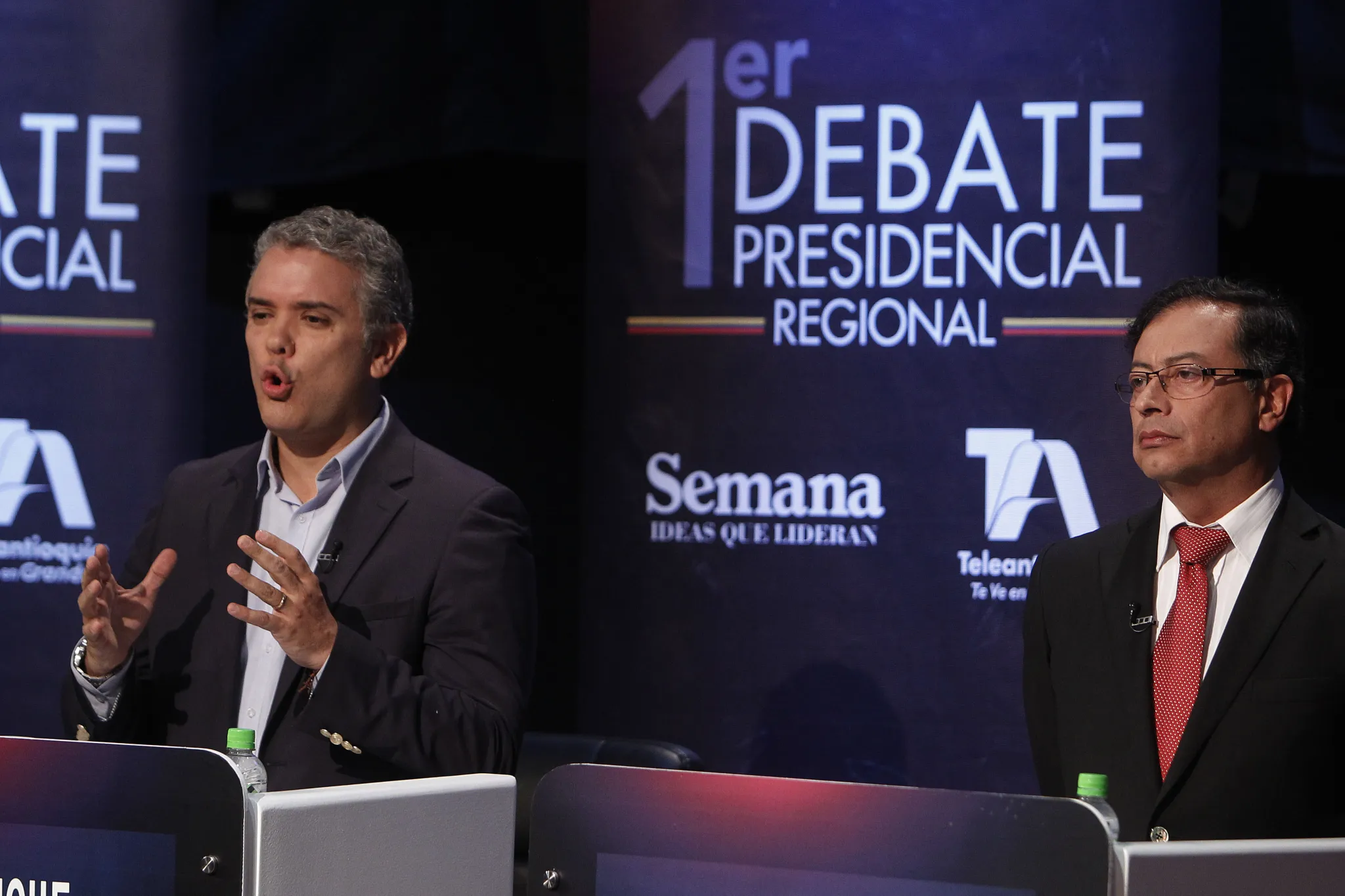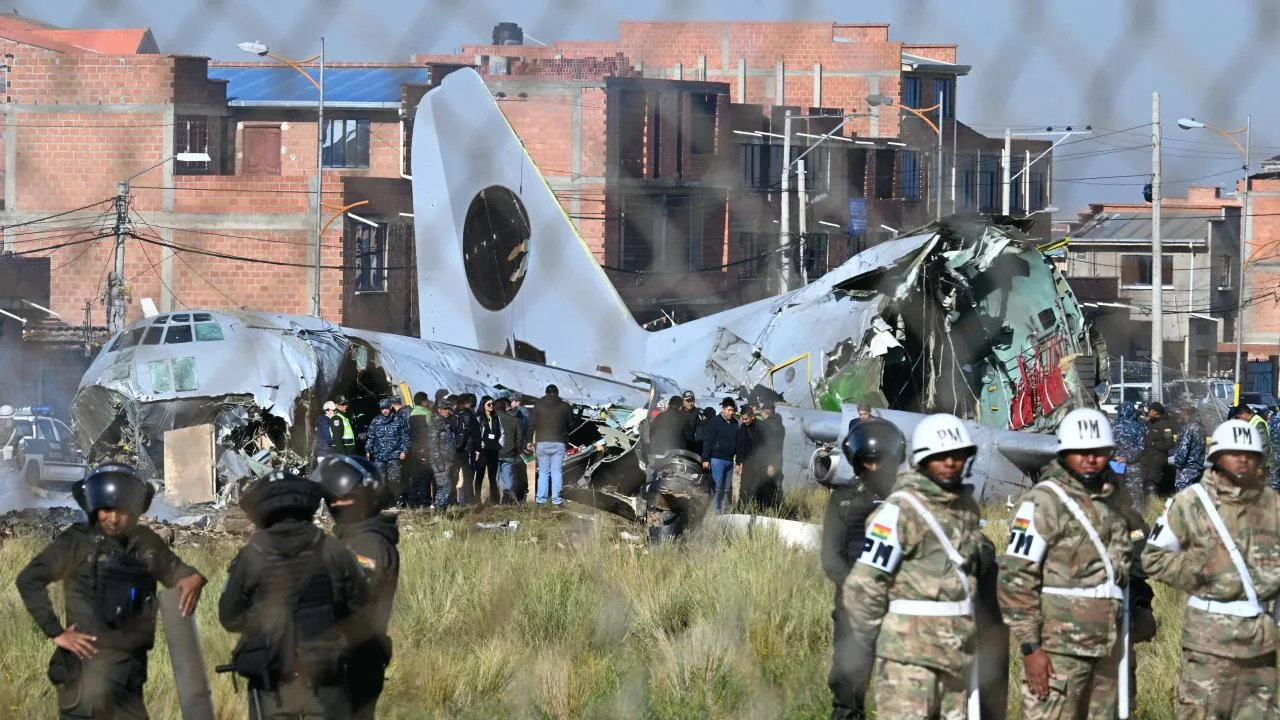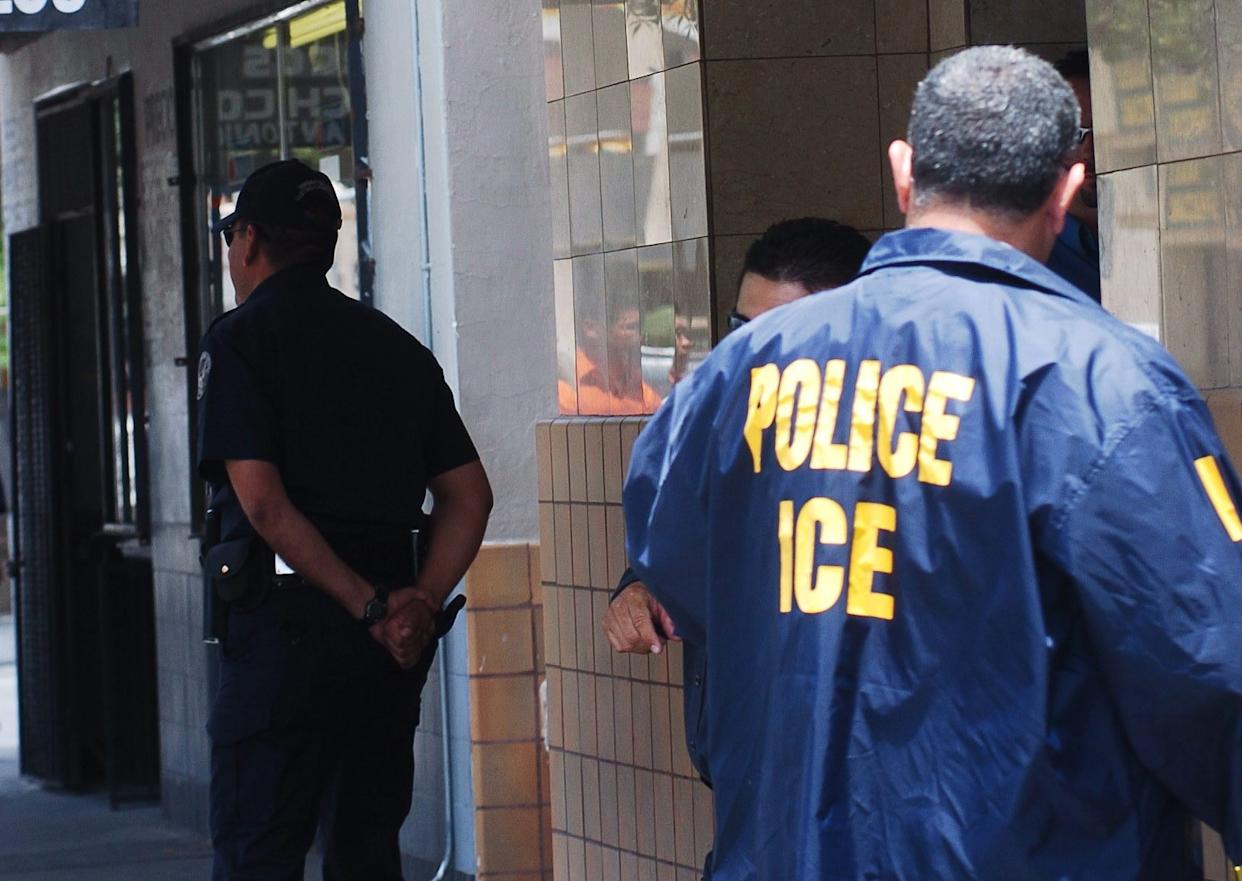International
Duque sees “despair” and “insecurity” in Petro’s attitude and proposes a “democratic debate”

Former Colombian President Iván Duque sees that there is “despair” and “insecurity” in his successor, Gustavo Petro, who accused him of being a “terrorist” for the “murder” of dozens of young people at the hands of the public forces during the 2021 protests.
In a message published on the social network X, Duque (2018-2022) made a parallel between his career and that of Petro. He asked “that the healthy democratic debate begin now” for the presidential elections of 2026.
“There is despair, insecurity, paranoia, schizophrenia evident in this behavior, which intensifies with the drunkenness of applause and the motivation to eclipse failures and scandals. No more threats or attacks. Let the tragedy end on August 7, 2026 (the day that Petro’s mandate culminates), but let the healthy democratic debate begin without stopping at more crazy things to attract attention,” Duque said.
The day before, President Petro called his predecessor a “terrorist” for the “murder” of young people during the social outcuse of 2021. According to social organizations, more than 80 people died violently, most of them from police abuses.
“When 60 young people killed by the State die, burned, tortured, when thousands of young people were arrested, the question is then: who was the terrorist? Who should be described as a terrorist?” Petro asked in a government act in Cali, capital of the department of Valle del Cauca (southwest).
Petro added: “The president of the republic today has to say that the terrorist was not the popular youth, that the terrorist was the State of Colombia and particularly the Government of (…) Mr. Duque. The 60 killed in Cali by you were not terrorists, the terrorist was you.”
In that sense, Duque wondered, “Who is the terrorist?” He recalled that he has never been a member of “illegal or terrorist armed groups,” as if Petro did, who was a guerrilla of the 19 de Abril Movement (M-19).
“I have never made an apology for terrorism by flying flags of illegal armed groups,” added the former president, referring to the controversy that erose last month when Petro ordered the M-19 flag to be displayed in a public event in which he commemorated the murder 34 years ago of former guerrilla commander Carlos Pizarro.
Among other issues that Duque reminded Petro of, there are the “alliances with criminals in prisons to make the most of the election.” Or the call to young people to “express themselves with violence and vandalism with the promise of impunity if they are prosecuted.”
“I have never exalted the seizure of the Palace of Justice (in 1985), the murder of José Raquel Mercado (union leader kidnapped and executed by the M-19), the Tacueyó Massacre (in the 1980s), nor hundreds of kidnappings calling them ‘revolutionary’ acts,” Duque added in reference to Petro’s attitudes.
Likewise, Duque said that he has not “promoted the paramilitary leaders to return to the country to avoid their punishments, revictimizing those who have caused them so much pain,” referring to what happened to the former commander of the United Self-Defense of Colombia (AUC) Salvatore Mancuso, appointed peace manager by the Government and who may be released in the coming days.
“I have not threatened journalists, businessmen, politicians, judges, guilds, industrialists, intellectuals for not thinking like me, much less disagreeing with me,” Duque concluded in his decalogue of response to Petro.
Former President Álvaro Uribe (2002-2010) accused the current president of Colombia, Gustavo Petro, of wanting to instigate “civil war” in the country and of constantly challenging the Constitution.
“The president instigates civil war. Let’s add so that that war does not divide the citizenry, so that it is the president’s against all of Colombia,” said Uribe, leader of the opposition party Centro Democrático, in a video published on his social networks.
Uribe assured that “the president of the republic, instead of reorienting the young people of Cali, as part of the support he wants to give them, instigates them more to violence, applauds violent acts.”
“He repeats to them that my permanence in politics is attachment to power when he should give thanks that that permanence allowed him to base himself on anti-uribism for his election,” said Uribe, who ruled in the periods 2002-2006 and 2006-2010.
He also stated that Petro defies the Constitution as a step “in his purpose of unleashing a civil war between compatriots.”
“We work so that respect for the Constitution and respect for the ideas of fraternal economy one more to the citizenry (…) That it is against all of Colombia, that it does not divide the Colombians more,” he concluded.
International
Bolivia Orders Three Investigations Into Deadly Military Plane Crash

Bolivia’s Defense Minister Marcelo Salinas announced Monday that three separate investigations will be conducted into Friday’s crash of a military cargo aircraft at El Alto International Airport, near La Paz, which left at least 22 people dead.
The Hercules aircraft, operated by the Fuerza Aérea Boliviana (FAB), was transporting cash intended for the Central Bank of Bolivia when it overshot the runway after landing from the city of Santa Cruz. The plane reportedly traveled nearly one kilometer beyond the airport perimeter.
The incident sparked chaotic scenes, with individuals attempting to collect scattered banknotes. Authorities detained 51 people in the aftermath, and the government declared three days of national mourning.
Multiple Investigations Underway
The first inquiry is being led by a military board from the Bolivian Air Force, which has already taken custody of the aircraft’s black box for analysis.
Minister Salinas said two additional investigations will follow — one conducted by the insurance company and another by the aircraft’s manufacturer.
“At least two more investigations will come, that of the insurance company and that of the aircraft manufacturer,” Salinas said during a press conference in Santa Cruz.
He cautioned that the investigative process could take between three and six months, noting that the black box cannot be opened in Bolivia due to the lack of specialized laboratories for analysis.
Awaiting Official Findings
Salinas stressed that the FAB investigative board is the highest authority in the case and urged the public to wait for its conclusions to avoid speculation about the causes of the crash.
He also confirmed that the government has contacted the families of the 22 victims and the 37 injured, as well as the owners of 15 damaged vehicles, to coordinate procedures with the insurer and cover the corresponding expenses.
International
Mexico Calls for Immediate Probe After National Dies in ICE Custody

Mexico’s Secretaría de Relaciones Exteriores (SRE) on Monday called on U.S. authorities to conduct an “immediate and thorough” investigation into the death of a Mexican national while in custody of U.S. Immigration and Customs Enforcement (ICE) at a processing facility in California.
In a statement, the Mexican government described the death as “regrettable” and urged U.S. officials to clarify the circumstances surrounding the case in order to “determine responsibilities and ensure that such events do not happen again.”
Death at Adelanto Processing Center
According to available information, the Mexican citizen died at the Adelanto Processing Center in California while under ICE custody. Authorities have not yet released the individual’s identity or the cause of death.
Following the incident, Mexico’s Foreign Ministry formally requested “detailed information” from U.S. authorities, including the detainee’s medical records and custody reports.
Consular Assistance Activated
The Mexican Consulate in San Bernardino, California, has activated consular assistance protocols to provide ongoing support to the deceased’s family. Officials have contacted relatives to express condolences and offer legal guidance, as well as assistance with the necessary procedures to repatriate the remains.
“The handling of situations like this and the establishment of mechanisms to resolve them are priorities for the Government of Mexico,” the Foreign Ministry said, adding that it will formally request an investigation into any systemic conditions that may have contributed to such incidents.
Local Mexican media reported that seven Mexican nationals died while in ICE detention last year — the highest number recorded since the agency was created.
International
Anti-ICE Billboard Campaign Targets Immigration Spending in 31 U.S. Cities

More than 200 billboards criticizing U.S. Immigration and Customs Enforcement (ICE) began appearing Monday in 31 cities across the United States, including Miami, as part of a campaign highlighting the high cost of immigration enforcement operations for taxpayers.
The initiative, titled “ICE Costs Us,” was launched by the civil rights organization Mijente and will run for four weeks.
Criticism of Spending and Enforcement Tactics
The billboards feature images of ICE agents during arrests or carrying military-style weapons. According to the organization, spending on military-grade equipment for the agency has increased by 600 percent in recent years.
Several signs display messages such as:
“Your taxes are being wasted” and “ICE’s cruelty costs you $28 billion,” referring to the agency’s annual budget.
In a statement, Marisa Franco, co-founder of the Mijente Support Committee, said:
“For too long, our government has prioritized building cages and investing billions in an immigration enforcement apparatus that has left families torn apart and communities terrified.”
She added that “Millions of Americans are living paycheck to paycheck, yet this violent agency continues operating with a blank check. These decisions do not make us safer nor improve our economic security. Our billboards highlight these choices and demand a different path.”
Budget Debate and Medicaid Comparison
The campaign also draws a comparison between ICE’s funding and the estimated 17 million people who could lose health coverage under Medicaid due to federal budget cuts under President Donald Trump.
Other billboard messages seen in various cities include:
“They get billions to beat us; we get layoffs and rising rents” and “Funding ICE is a fast track to fascism.”
Organizers say the goal is to spark public debate about the allocation of federal funds for immigration enforcement and the broader economic and social impact of such policies on communities nationwide.
-

 International2 days ago
International2 days agoIran Reports 201 Dead, 747 Injured After U.S. and Israeli Strikes
-

 International5 days ago
International5 days agoCocaine Production Surges 34% in 2023 as Market Expands into Africa and Asia
-

 International4 days ago
International4 days agoTrump Floats “Friendly Takeover” of Cuba Amid Rising Tensions
-

 Sin categoría3 days ago
Sin categoría3 days agoTrump: ‘We Think It’s True’ Amid Claims Iran’s Supreme Leader Was Killed
-

 International3 days ago
International3 days agoSecurity Council to Hold Emergency Meeting on Middle East Crisis
-

 International2 days ago
International2 days agoPope Leo XIV Urges End to ‘Spiral of Violence’ in Middle East
-

 International5 days ago
International5 days agoFederal Judge Blocks Trump Policy Allowing Deportations to Third Countries
-

 International4 days ago
International4 days agoArgentina’s Senate Reviews Milei-Backed Labor Overhaul
-

 International16 hours ago
International16 hours agoBrazil’s Supreme Court Rejects Bolsonaro’s Bid for House Arrest
-

 International5 days ago
International5 days agoClinton Accuses Republican Committee of Using Epstein Case to Shield Trump
-

 International16 hours ago
International16 hours agoAnti-ICE Billboard Campaign Targets Immigration Spending in 31 U.S. Cities
-

 International16 hours ago
International16 hours agoTrump Warns of ‘Major Wave’ of Attacks as Iran Conflict Escalates
-

 International16 hours ago
International16 hours agoMexico Calls for Immediate Probe After National Dies in ICE Custody
-

 Central America16 hours ago
Central America16 hours agoPanama Canal Monitoring Trade as Middle East Conflict Disrupts Shipping
-

 International16 hours ago
International16 hours agoBolivia Orders Three Investigations Into Deadly Military Plane Crash




























